2020年最新新修订《劳动合同法》解读模板可编辑
- 格式:pptx
- 大小:1.13 MB
- 文档页数:86
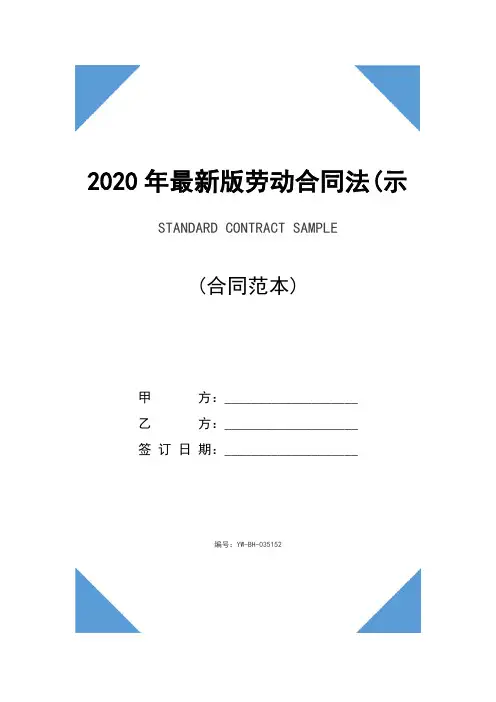
STANDARD CONTRACT SAMPLE(合同范本)甲方:____________________乙方:____________________签订日期:____________________编号:YW-BH-0351522020年最新版劳动合同法(示2020年最新版劳动合同法(示范合同)订立合同双方:招聘方:_____(企业,事业,机关,团体等单位的行政)简称甲方受聘方:_____(合同制职工)简称乙方;甲方招聘合同制职工,按有关规定,已报请有关部门的批准(或同意).甲方已向乙方如实介绍涉及合同的有关情况;乙方已向甲方提交劳动手册.甲乙双方本着自愿、平等的原则,经协商一致,特签订本合同,以便共同遵守.第一条合同期限合同期限为___年(或___个月),从一九____年起至一九____年____月____日止. (没有一定期限的合同或以完成一项工作的时间为期限的合同,应注明“本合同无一定期限”或“本合同以某一工作完成为届满期限.)第二条试用期限试用期限为___个月(或___年),即从一九____年___月___日起至一九____年____月____日止.(试用期限的长短,有关部门有规定的,按规定执行;有关部门无规定的,由招聘方根据受聘方的工作能力和实际水平确定.)第三条职务(或工种)甲方聘请乙方担任_________职务(或从事某工种的工作).第四条工作时间每周工作六天,星期日休息.每天工作时间为八小时.上下班时间按甲方规定执行. (以完成一定工作量为期限的合同,工作时间由双方商定.)第五条劳动报酬〈一〉乙方在试用期间,月薪为____元.试用期满后,按乙方的技术水平、劳动态度和工作效率评定,根据所评定的级别或职务确定月薪.(以完成一定工作量的时间为合同期限的,亦可按工作量确定报酬.实行计件工资的,按计件付酬.)〈二〉乙方享受的岗位津贴和奖金待遇,与同工种固定职工相同.第六条生活福利待遇(一)补贴待遇:乙方享受交通费补贴、粮食补贴、取暖费补贴等与固定职工相同.(二)假日待遇:乙方享受节日假、婚假、产假、丧假与固定职工相同。
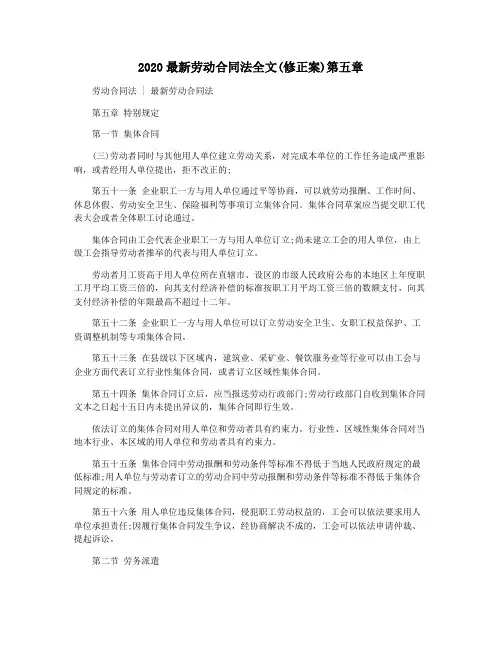
2020最新劳动合同法全文(修正案)第五章劳动合同法 | 最新劳动合同法第五章特别规定第一节集体合同(三)劳动者同时与其他用人单位建立劳动关系,对完成本单位的工作任务造成严重影响,或者经用人单位提出,拒不改正的;第五十一条企业职工一方与用人单位通过平等协商,可以就劳动报酬、工作时间、休息休假、劳动安全卫生、保险福利等事项订立集体合同。
集体合同草案应当提交职工代表大会或者全体职工讨论通过。
集体合同由工会代表企业职工一方与用人单位订立;尚未建立工会的用人单位,由上级工会指导劳动者推举的代表与用人单位订立。
劳动者月工资高于用人单位所在直辖市、设区的市级人民政府公布的本地区上年度职工月平均工资三倍的,向其支付经济补偿的标准按职工月平均工资三倍的数额支付,向其支付经济补偿的年限最高不超过十二年。
第五十二条企业职工一方与用人单位可以订立劳动安全卫生、女职工权益保护、工资调整机制等专项集体合同。
第五十三条在县级以下区域内,建筑业、采矿业、餐饮服务业等行业可以由工会与企业方面代表订立行业性集体合同,或者订立区域性集体合同。
第五十四条集体合同订立后,应当报送劳动行政部门;劳动行政部门自收到集体合同文本之日起十五日内未提出异议的,集体合同即行生效。
依法订立的集体合同对用人单位和劳动者具有约束力。
行业性、区域性集体合同对当地本行业、本区域的用人单位和劳动者具有约束力。
第五十五条集体合同中劳动报酬和劳动条件等标准不得低于当地人民政府规定的最低标准;用人单位与劳动者订立的劳动合同中劳动报酬和劳动条件等标准不得低于集体合同规定的标准。
第五十六条用人单位违反集体合同,侵犯职工劳动权益的,工会可以依法要求用人单位承担责任;因履行集体合同发生争议,经协商解决不成的,工会可以依法申请仲裁、提起诉讼。
第二节劳务派遣第五十七条劳务派遣单位应当依照公司法的有关规定设立,注册资本不得少于五十万元。
第五十八条劳务派遣单位是本法所称用人单位,应当履行用人单位对劳动者的义务。
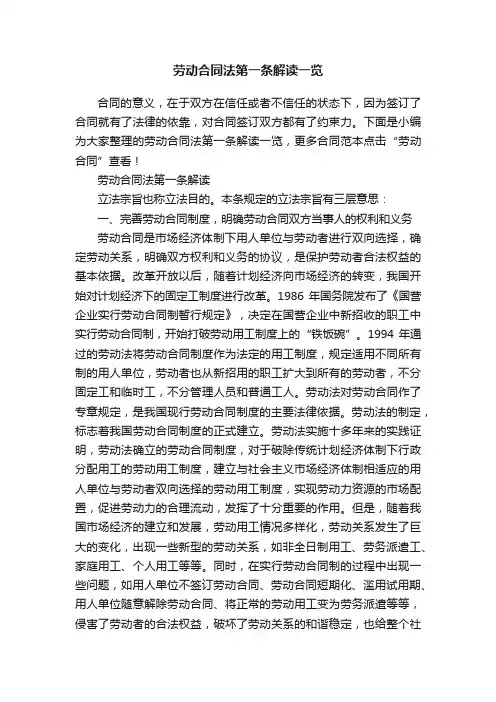
劳动合同法第一条解读一览合同的意义,在于双方在信任或者不信任的状态下,因为签订了合同就有了法律的依靠,对合同签订双方都有了约束力。
下面是小编为大家整理的劳动合同法第一条解读一览,更多合同范本点击“劳动合同”查看!劳动合同法第一条解读立法宗旨也称立法目的。
本条规定的立法宗旨有三层意思:一、完善劳动合同制度,明确劳动合同双方当事人的权利和义务劳动合同是市场经济体制下用人单位与劳动者进行双向选择,确定劳动关系,明确双方权利和义务的协议,是保护劳动者合法权益的基本依据。
改革开放以后,随着计划经济向市场经济的转变,我国开始对计划经济下的固定工制度进行改革。
1986年国务院发布了《国营企业实行劳动合同制暂行规定》,决定在国营企业中新招收的职工中实行劳动合同制,开始打破劳动用工制度上的“铁饭碗”。
1994年通过的劳动法将劳动合同制度作为法定的用工制度,规定适用不同所有制的用人单位,劳动者也从新招用的职工扩大到所有的劳动者,不分固定工和临时工,不分管理人员和普通工人。
劳动法对劳动合同作了专章规定,是我国现行劳动合同制度的主要法律依据。
劳动法的制定,标志着我国劳动合同制度的正式建立。
劳动法实施十多年来的实践证明,劳动法确立的劳动合同制度,对于破除传统计划经济体制下行政分配用工的劳动用工制度,建立与社会主义市场经济体制相适应的用人单位与劳动者双向选择的劳动用工制度,实现劳动力资源的市场配置,促进劳动力的合理流动,发挥了十分重要的作用。
但是,随着我国市场经济的建立和发展,劳动用工情况多样化,劳动关系发生了巨大的变化,出现一些新型的劳动关系,如非全日制用工、劳务派遣工、家庭用工、个人用工等等。
同时,在实行劳动合同制的过程中出现一些问题,如用人单位不签订劳动合同、劳动合同短期化、滥用试用期、用人单位随意解除劳动合同、将正常的劳动用工变为劳务派遣等等,侵害了劳动者的合法权益,破坏了劳动关系的和谐稳定,也给整个社会的稳定带来隐患。
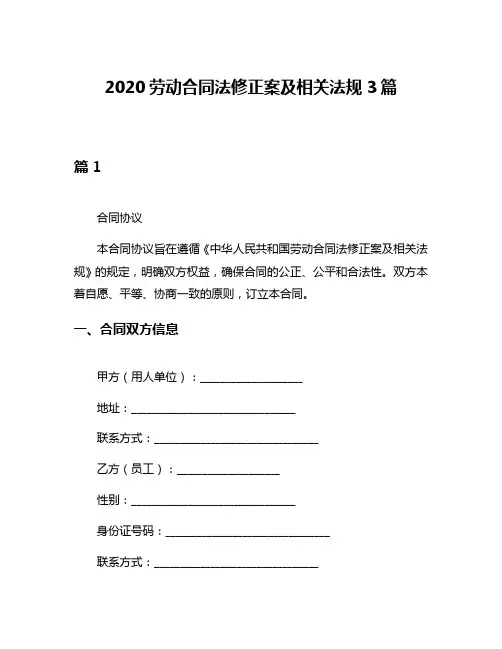
2020劳动合同法修正案及相关法规3篇篇1合同协议本合同协议旨在遵循《中华人民共和国劳动合同法修正案及相关法规》的规定,明确双方权益,确保合同的公正、公平和合法性。
双方本着自愿、平等、协商一致的原则,订立本合同。
一、合同双方信息甲方(用人单位):____________________地址:________________________________联系方式:________________________________乙方(员工):____________________性别:________________________________身份证号码:________________________________联系方式:________________________________二、工作内容及地点1. 乙方应在甲方规定的岗位上履行职责,岗位名称:____________________。
2. 岗位职责及工作内容详见甲方制定的岗位说明书。
3. 工作地点:____________________。
三、工作时间与休息休假1. 甲方按照国家规定实行标准工时制度,乙方的工作时间平均每周不超过四十小时。
2. 甲方应保证乙方享有法定休息休假权利。
3. 加班、调休等事项按照甲方规定及国家法律法规执行。
四、劳动报酬及福利待遇1. 乙方的工资按照甲方薪酬制度执行,不得低于当地最低工资标准。
2. 甲方应按月支付乙方工资,支付日期为每月的______日。
3. 甲方应根据国家法律法规为乙方缴纳社会保险费及住房公积金。
4. 乙方享有甲方规定的各项福利待遇。
五、劳动合同签订及期限1. 本合同为固定期限劳动合同,合同期限为______年,自______年______月______日起至______年______月______日止。
2. 合同签订后,双方应严格遵守,不得擅自变更或解除。
如需变更或解除,应经双方协商一致,并按规定程序办理。
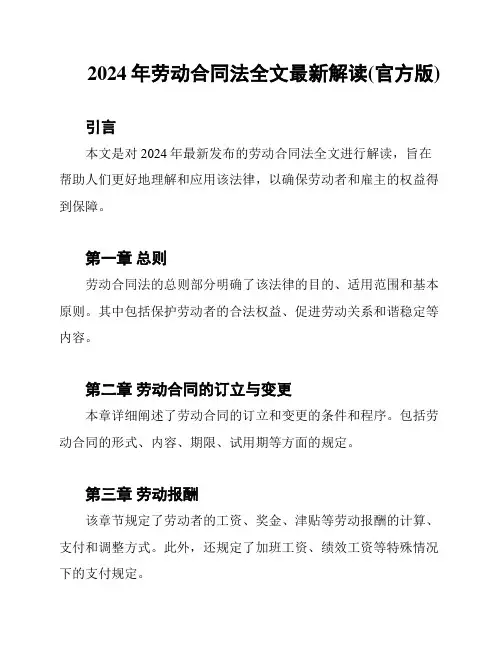
2024年劳动合同法全文最新解读(官方版)引言本文是对2024年最新发布的劳动合同法全文进行解读,旨在帮助人们更好地理解和应用该法律,以确保劳动者和雇主的权益得到保障。
第一章总则劳动合同法的总则部分明确了该法律的目的、适用范围和基本原则。
其中包括保护劳动者的合法权益、促进劳动关系和谐稳定等内容。
第二章劳动合同的订立与变更本章详细阐述了劳动合同的订立和变更的条件和程序。
包括劳动合同的形式、内容、期限、试用期等方面的规定。
第三章劳动报酬该章节规定了劳动者的工资、奖金、津贴等劳动报酬的计算、支付和调整方式。
此外,还规定了加班工资、绩效工资等特殊情况下的支付规定。
第四章工作时间和休假本章详细说明了劳动者的工作时间和休假的安排。
包括法定工时、加班、休息日、法定假日、年假等方面的规定。
第五章劳动保护和劳动条件该章节重点关注劳动者的劳动保护和劳动条件。
包括劳动安全卫生、职业病防治、女职工和未成年劳动者的保护等内容。
第六章劳动合同的解除和终止本章详细说明了劳动合同的解除和终止的条件和程序。
包括劳动合同的解除事由、解除程序、经济补偿等方面的规定。
第七章劳动争议解决该章节规定了劳动争议的解决途径和程序。
包括劳动争议调解、仲裁、诉讼等方面的规定。
第八章法律责任本章详细说明了违反劳动合同法相关规定的法律责任和处罚措施。
结论以上是对2024年劳动合同法全文的最新解读,该法律对于保障劳动者和雇主的权益具有重要意义。
我们应当在遵守该法律的前提下,合理落实劳动合同,促进劳动关系的和谐稳定发展。
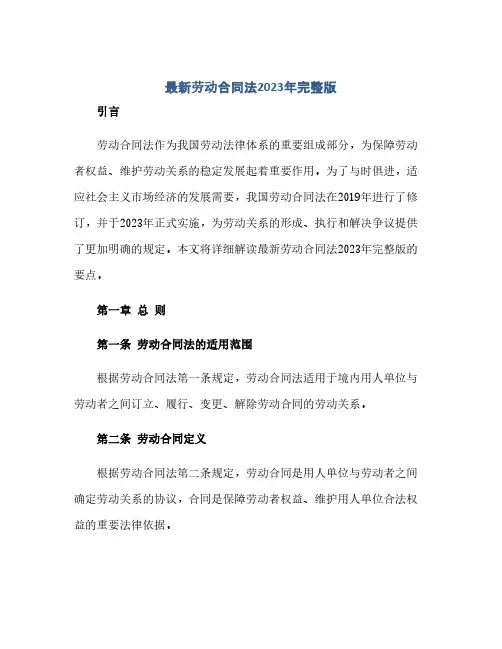
最新劳动合同法2023年完整版引言劳动合同法作为我国劳动法律体系的重要组成部分,为保障劳动者权益、维护劳动关系的稳定发展起着重要作用。
为了与时俱进,适应社会主义市场经济的发展需要,我国劳动合同法在2019年进行了修订,并于2023年正式实施,为劳动关系的形成、执行和解决争议提供了更加明确的规定。
本文将详细解读最新劳动合同法2023年完整版的要点。
第一章总则第一条劳动合同法的适用范围根据劳动合同法第一条规定,劳动合同法适用于境内用人单位与劳动者之间订立、履行、变更、解除劳动合同的劳动关系。
第二条劳动合同定义根据劳动合同法第二条规定,劳动合同是用人单位与劳动者之间确定劳动关系的协议,合同是保障劳动者权益、维护用人单位合法权益的重要法律依据。
第三条劳动合同的订立和变更劳动合同的订立和变更应当遵循自愿、平等、协商一致的原则,符合国家法律法规的规定。
第四条劳动合同的期限劳动合同可以分为固定期限劳动合同和无固定期限劳动合同两种类型。
用人单位依法订立劳动合同时,应当明确合同期限。
第五条劳动合同的解除和终止劳动合同可以根据协议解除、一方解除或依法解除,应当根据法律规定的程序进行。
第二章补充性协议第六条劳动合同补充性协议的签订用人单位与劳动者可以根据实际情况订立补充性协议,对劳动关系的其他事项进行约定。
第七条劳动合同补充性协议的效力劳动合同补充性协议具有法律效力,各方当事人应当按照补充性协议履行义务。
第三章劳动条件第八条劳动条件的约定劳动合同应当明确约定劳动条件,包括工作内容、工作时间、工作地点、工作报酬等。
第九条工作时间劳动合同中应当明确规定工作时间,用人单位应当确保劳动者的合法权益。
第十条工作报酬劳动合同中应当明确约定工作报酬,用人单位应当及时支付劳动者工资、奖金、津贴等劳动报酬。
第四章劳动权益第十一条劳动者的休息和假期劳动合同应当明确规定劳动者的休息和假期时间,劳动者享有法定节假日、年休假以及其他休假权益。
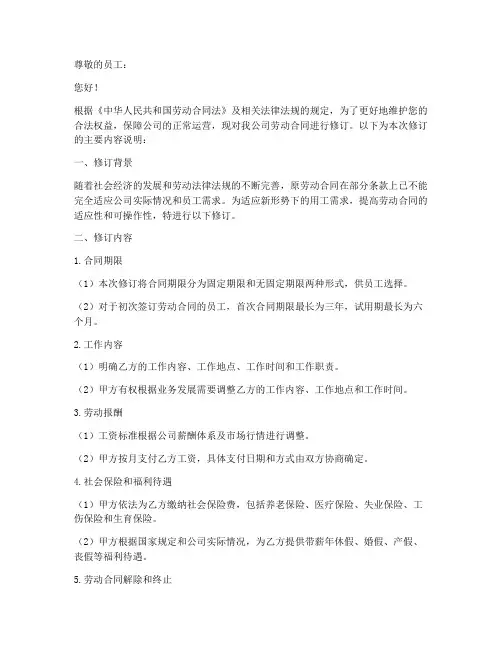
尊敬的员工:您好!根据《中华人民共和国劳动合同法》及相关法律法规的规定,为了更好地维护您的合法权益,保障公司的正常运营,现对我公司劳动合同进行修订。
以下为本次修订的主要内容说明:一、修订背景随着社会经济的发展和劳动法律法规的不断完善,原劳动合同在部分条款上已不能完全适应公司实际情况和员工需求。
为适应新形势下的用工需求,提高劳动合同的适应性和可操作性,特进行以下修订。
二、修订内容1.合同期限(1)本次修订将合同期限分为固定期限和无固定期限两种形式,供员工选择。
(2)对于初次签订劳动合同的员工,首次合同期限最长为三年,试用期最长为六个月。
2.工作内容(1)明确乙方的工作内容、工作地点、工作时间和工作职责。
(2)甲方有权根据业务发展需要调整乙方的工作内容、工作地点和工作时间。
3.劳动报酬(1)工资标准根据公司薪酬体系及市场行情进行调整。
(2)甲方按月支付乙方工资,具体支付日期和方式由双方协商确定。
4.社会保险和福利待遇(1)甲方依法为乙方缴纳社会保险费,包括养老保险、医疗保险、失业保险、工伤保险和生育保险。
(2)甲方根据国家规定和公司实际情况,为乙方提供带薪年休假、婚假、产假、丧假等福利待遇。
5.劳动合同解除和终止(1)明确劳动合同解除和终止的条件、程序及双方责任。
(2)对于违反合同约定的员工,甲方有权依法解除劳动合同,并承担相应责任。
6.争议解决(1)明确劳动合同争议的解决途径,包括协商、调解、仲裁和诉讼。
(2)双方应本着公平、公正、诚信的原则,积极解决争议。
三、执行时间本次修订的劳动合同自发布之日起执行。
已签订原劳动合同的员工,如需签订新修订的劳动合同,请于发布之日起一个月内办理相关手续。
四、其他事项1.本说明仅作为新修订劳动合同的补充,如与新修订劳动合同内容不一致,以新修订劳动合同为准。
2.如有疑问,请及时与人力资源部联系。
感谢您对我们公司的支持和理解,我们将竭诚为您服务。
特此说明。
公司名称:发布日期:____年____月____日。
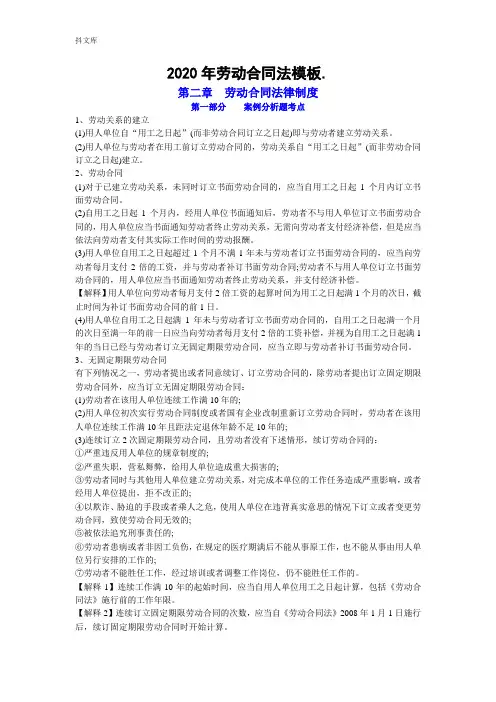
抖文库 2020年劳动合同法模板. 第二章 劳动合同法律制度 第一部分 案例分析题考点 1、劳动关系的建立 (1)用人单位自“用工之日起”(而非劳动合同订立之日起)即与劳动者建立劳动关系。 (2)用人单位与劳动者在用工前订立劳动合同的,劳动关系自“用工之日起”(而非劳动合同订立之日起)建立。 2、劳动合同 (1)对于已建立劳动关系,未同时订立书面劳动合同的,应当自用工之日起1个月内订立书面劳动合同。 (2)自用工之日起1个月内,经用人单位书面通知后,劳动者不与用人单位订立书面劳动合同的,用人单位应当书面通知劳动者终止劳动关系,无需向劳动者支付经济补偿,但是应当依法向劳动者支付其实际工作时间的劳动报酬。 (3)用人单位自用工之日起超过1个月不满1年未与劳动者订立书面劳动合同的,应当向劳动者每月支付2倍的工资,并与劳动者补订书面劳动合同;劳动者不与用人单位订立书面劳动合同的,用人单位应当书面通知劳动者终止劳动关系,并支付经济补偿。 【解释】用人单位向劳动者每月支付2倍工资的起算时间为用工之日起满1个月的次日,截止时间为补订书面劳动合同的前1日。 (4)用人单位自用工之日起满1年未与劳动者订立书面劳动合同的,自用工之日起满一个月的次日至满一年的前一日应当向劳动者每月支付2倍的工资补偿,并视为自用工之日起满1年的当日已经与劳动者订立无固定期限劳动合同,应当立即与劳动者补订书面劳动合同。 3、无固定期限劳动合同 有下列情况之一,劳动者提出或者同意续订、订立劳动合同的,除劳动者提出订立固定期限劳动合同外,应当订立无固定期限劳动合同: (1)劳动者在该用人单位连续工作满10年的; (2)用人单位初次实行劳动合同制度或者国有企业改制重新订立劳动合同时,劳动者在该用人单位连续工作满10年且距法定退休年龄不足10年的; (3)连续订立2次固定期限劳动合同,且劳动者没有下述情形,续订劳动合同的: ①严重违反用人单位的规章制度的; ②严重失职,营私舞弊,给用人单位造成重大损害的; ③劳动者同时与其他用人单位建立劳动关系,对完成本单位的工作任务造成严重影响,或者经用人单位提出,拒不改正的; ④以欺诈、胁迫的手段或者乘人之危,使用人单位在违背真实意思的情况下订立或者变更劳动合同,致使劳动合同无效的; ⑤被依法追究刑事责任的; ⑥劳动者患病或者非因工负伤,在规定的医疗期满后不能从事原工作,也不能从事由用人单位另行安排的工作的; ⑦劳动者不能胜任工作,经过培训或者调整工作岗位,仍不能胜任工作的。 【解释1】连续工作满10年的起始时间,应当自用人单位用工之日起计算,包括《劳动合同法》施行前的工作年限。 【解释2】连续订立固定期限劳动合同的次数,应当自《劳动合同法》2008年1月1日施行后,续订固定期限劳动合同时开始计算。 抖文库 【解释3】用人单位自用工之日起满1年不与劳动者订立书面劳动合同的,视为用人单位自用工之日起满1年的当日已经与劳动者订立无固定期限劳动合同。 4、带薪年休假 (1)年休假的标准 职工累计工作已满1年不满10年的,年休假5天;已满10年不满20年的,年休假10天;已满20年的,年休假15天。 (2)不享受“当年的年休假”的情形 ①职工依法享受寒暑假,其假期天数多于年休假天数的; ②职工请事假累计20天以上且单位按照规定不扣工资的; ③累计工作满1年不满10年的职工,请病假累计2个月以上的; ④累计工作满10年不满20年的职工,请病假累计3个月以上的; ⑤累计工作满20年以上的职工,请病假累计4个月以上的。 5、加班费 (1)用人单位依法安排劳动者在日标准工作时间以外延长工作时间的,按照不低于劳动合同规定的劳动者本人小时工资标准的150%支付劳动者工资。 (2)用人单位依法安排劳动者在“休息日”工作,不能安排补休的,按照不低于劳动合同规定的劳动者本人日或小时工资标准的200%支付劳动者工资。 (3)用人单位依法安排劳动者在“法定休假日”工作的,按照不低于劳动合同规定的劳动者本人日或小时工资标准的300%支付劳动者工资。 【解释】用人单位安排加班不支付加班费的,由劳动行政部门责令限期支付加班费,逾期不支付的,责令用人单位按应付金额50%以上100%以下的标准向劳动者加付赔偿金。 6、试用期 (1)劳动合同期限3个月以上不满1年的,试用期不得超过1个月;劳动合同期限1年以上不满3年的,试用期不得超过2个月;3年以上固定期限和无固定期限的劳动合同,试用期不得超过6个月。 【解释】1年以上包括1年,不满3年不包括3年,不得超过1个月是指小于等于1个月。 (2)试用期包含在劳动合同期限内。 (3)用人单位违反规定与劳动者约定试用期的,由劳动行政部门责令改正;违法约定的试用期已经履行的,由用人单位以劳动者试用期满月工资为标准,按已经履行的超过法定试用期的期间向劳动者支付赔偿金。 (4)试用期工资的强制性规定 劳动者在试用期的工资不得低于本单位相同岗位最低档工资或者劳动合同约定工资的80%,并不得低于用人单位所在地的最低工资标准。 7、服务期 (1)劳动者违反服务期约定的,应当按照约定向用人单位支付违约金。违约金的数额不得超过用人单位提供的培训费用。对已经履行部分服务期限的,用人单位要求劳动者支付的违约金不得超过服务期尚未履行部分所应分摊的培训费用。 (2)即使用人单位单方面声称已出资,但不能提供相应的支付凭证,则因其缺乏证据,也不能要求劳动者承担违约责任。 (3)在服务期内,如果劳动者因下列违纪等重大过错行为而被用人单位解除劳动关系的,用人单位仍有权要求其支付违约金: ①劳动者严重违反用人单位的规章制度的; ②劳动者严重失职,营私舞弊,给用人单位造成重大损害的; 抖文库 ③劳动者同时与其他用人单位建立劳动关系,对完成本单位的工作任务造成严重影响,或者经用人单位提出,拒不改正的;
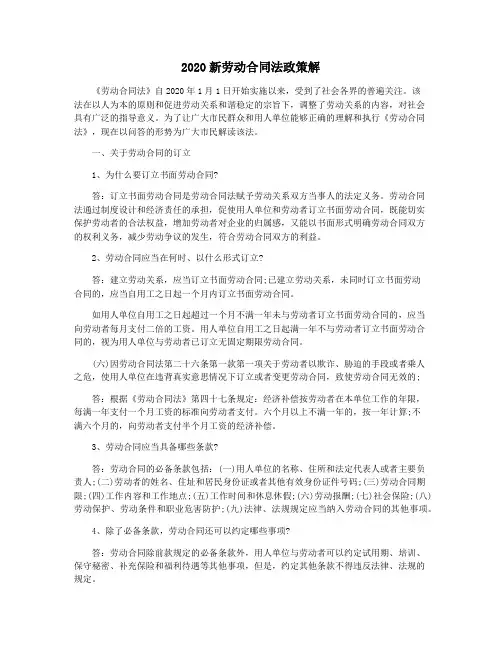
2020新劳动合同法政策解《劳动合同法》自2020年1月1日开始实施以来,受到了社会各界的普遍关注。
该法在以人为本的原则和促进劳动关系和谐稳定的宗旨下,调整了劳动关系的内容,对社会具有广泛的指导意义。
为了让广大市民群众和用人单位能够正确的理解和执行《劳动合同法》,现在以问答的形势为广大市民解读该法。
一、关于劳动合同的订立1、为什么要订立书面劳动合同?答:订立书面劳动合同是劳动合同法赋予劳动关系双方当事人的法定义务。
劳动合同法通过制度设计和经济责任的承担,促使用人单位和劳动者订立书面劳动合同,既能切实保护劳动者的合法权益,增加劳动者对企业的归属感,又能以书面形式明确劳动合同双方的权利义务,减少劳动争议的发生,符合劳动合同双方的利益。
2、劳动合同应当在何时、以什么形式订立?答:建立劳动关系,应当订立书面劳动合同;已建立劳动关系,未同时订立书面劳动合同的,应当自用工之日起一个月内订立书面劳动合同。
如用人单位自用工之日起超过一个月不满一年未与劳动者订立书面劳动合同的,应当向劳动者每月支付二倍的工资。
用人单位自用工之日起满一年不与劳动者订立书面劳动合同的,视为用人单位与劳动者已订立无固定期限劳动合同。
(六)因劳动合同法第二十六条第一款第一项关于劳动者以欺诈、胁迫的手段或者乘人之危,使用人单位在违背真实意思情况下订立或者变更劳动合同,致使劳动合同无效的;答:根据《劳动合同法》第四十七条规定:经济补偿按劳动者在本单位工作的年限,每满一年支付一个月工资的标准向劳动者支付。
六个月以上不满一年的,按一年计算;不满六个月的,向劳动者支付半个月工资的经济补偿。
3、劳动合同应当具备哪些条款?答:劳动合同的必备条款包括:(一)用人单位的名称、住所和法定代表人或者主要负责人;(二)劳动者的姓名、住址和居民身份证或者其他有效身份证件号码;(三)劳动合同期限;(四)工作内容和工作地点;(五)工作时间和休息休假;(六)劳动报酬;(七)社会保险;(八)劳动保护、劳动条件和职业危害防护;(九)法律、法规规定应当纳入劳动合同的其他事项。
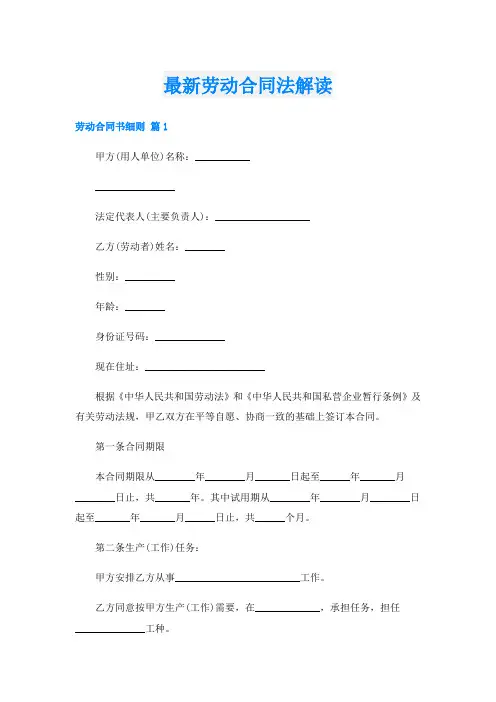
最新劳动合同法解读劳动合同书细则篇1甲方(用人单位)名称:___________________________法定代表人(主要负责人):___________________乙方(劳动者)姓名:________性别:__________年龄:________身份证号码:______________现在住址:________________________根据《中华人民共和国劳动法》和《中华人民共和国私营企业暂行条例》及有关劳动法规,甲乙双方在平等自愿、协商一致的基础上签订本合同。
第一条合同期限本合同期限从________年________月_______日起至______年_______月________日止,共_______年。
其中试用期从________年________月________日起至_______年_______月______日止,共______个月。
第二条生产(工作)任务:甲方安排乙方从事_________________________工作。
乙方同意按甲方生产(工作)需要,在_____________,承担任务,担任______________工种。
乙方应达到的数量、质量指标:________________________________________ 。
第三条劳动(工作)条件为保证乙方完成合同要求的生产(工作)任务,保障乙方的安全和健康,甲方应根据国家有关生产安全、劳动保护、卫生健康等规定,为乙方提供必要的生产(工作)条件。
具体内容如下:(略)第四条劳动纪律1、甲方应根据国家有关规定制定各项规章制度,具体内容如下:__________________________________ 。
2、乙方应严格遵守劳动纪律和规章制度,服从甲方管理,积极完成所从事的工作。
第五条工作时间和劳动报酬1、甲方应实行每日不超过8小时、每周工作时间不超过40小时的工作制,因生产需要确需延长工作时间时,须经乙方本人同意,并发给乙方加班工资。
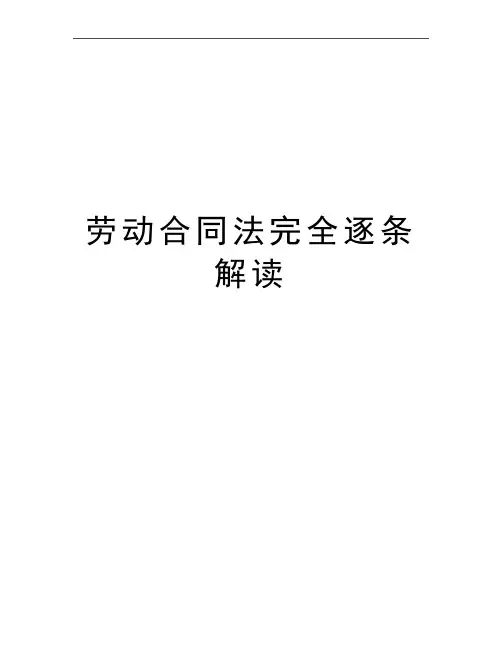
劳动合同法完全逐条解读劳动合同法完全逐条解读第一章总则第一条为了贯彻实施《中华人民共和国劳动合同法》(以下简称劳动合同法),制定本条例。
【解读】:本条规定了《中华人民共和国劳动合同法实施条例》的制定目的,也即通常所称的立法目的。
由于《劳动合同法》部分条款规定得不明确,在实践中导致有一些条款难以操作,为了贯彻实施劳动合同法,消除操作上的困局,有必要制定实施条例。
第二条各级人民政府和县级以上人民政府劳动行政等有关部门以及工会等组织,应当采取措施,推动劳动合同法的贯彻实施,促进劳动关系的和谐。
【解读】:为了促进和构建和谐劳动关系,消除社会各界对劳动合同法的"误读"与"消极评价",政府有关部门、工会等组织应当将劳动合同法的正面宣传视为己任。
第三条依法成立的会计师事务所、律师事务所等合伙组织和基金会,属于劳动合同法规定的用人单位。
【解读】:由于会计师事务所、律师事务所等机构遍布,实践中律师、会计师与其执业机构关系一直不明不白,各地各法院也对此处理不一,本条对劳动合同法所称的用人单位做了延伸解释。
第二章劳动合同的订立第四条劳动合同法规定的用人单位设立的分支机构,依法取得营业执照或者登记证书的,可以作为用人单位与劳动者订立劳动合同;未依法取得营业执照或者登记证书的,受用人单位委托可以与劳动者订立劳动合同。
【解读】:按照最高人民法院关于适用《中华人民共和国民事诉讼法》若干问题的意见,依法取得营业执照或者登记证书的分支机构属于民事诉讼法第四十九条规定的其他组织,是指合法成立、有一定的组织机构和财产,但又不具备法人资格的组织,包括:(1)法人依法设立并领取营业执照的分支机构;(2)中国人民银行、各专业银行设在各地的分支机构;(3)中国人民保险公司设在各地的分支机构。
依法取得营业执照或者登记证书的分支机构具有用工主体资格,可以作为用人单位与劳动者订立劳动合同,可以直接作为劳动合同中的甲方(用人单位)。
Labor Contract Law of the People's Republic of China 劳动合同法Order of the President of the People’s Republic of China (No. 65)The Labor Contract Law of the People’s Republic of China, adopted at the 28th Session of the Standing Committee of the 10th National People's Congress of the People’s Republic of China on June 29, 2007, is hereby promulgated and shall come into effect on January 1, 2008.Hu JintaoPresident of the People’s Republic of ChinaJune 29, 2007ContentsChapter I General ProvisionsChapter II Conclusion of Labor ContractsChapter III Performance and Amendment of Labor ContractsChapter IV Revocation and Termination of Labor ContractsChapter V Special Provisions-Part I Collective Contracts-Part II Work Placement-Part III Part-time LaborChapter VI Supervision and InspectionChapter VII Legal LiabilityChapter VIII Supplementary ProvisionsLabor Contract Lawof the People’s Republic of ChinaChapter 1 General ProvisionsArticle 1 This Law is formulated to improve the labor contract system, to specify the rights and obligations of the parties to labor contracts, to protect the legitimaterights and interests of workers, and to build and develop harmonious and stable employment relationships.Article 2 This Law applies to the establishment of labor relationships between, the conclusion of, performance of, amendment of, revocation of and termination of, labor contracts by workers and organizations such as enterprises, individual economic organizations and private non-enterprise units in the People’s Republic of China (“Employers”).The conclusion, performance, amendment, revocation and termination of labor contracts between state authorities, institutions or social organizations and workers with whom they establish employment relationships, shall be subject to this law.Article 3 The conclusion of a labor contract shall be based on the principles of lawfulness, fairness, equality, voluntariness, negotiated consensus and good faith.A lawfully concluded labor contract shall have binding force, both the Employer and the employee shall perform their respective obligations stipulated therein.Article 4 Employers shall formulate and improve labor rules and regulations in accordance with the law, so as to ensure that employees enjoy their labor rights and perform their labor obligations.The formulations, amendments and decisions made by Employers with respect to rules on labor compensation, working hours, leave and rest, occupational safety and hygiene, insurance and welfare, training, work discipline or work quota management, etc., which have a direct impact on employees’ immediate rights and interests, or other material matters, shall be presented to and discussed with the employee representative congress or all the employees, and the proposal and advice thereof shall be determined after consultation with the labor union or employee representative on the basis of equality.If, during the implementation of a rule or regulation or decision on a material matter, the labor union or any of the employees deems it inappropriate, they shall be entitled to raise the issue with the Employer and have it amended after consultation.The Employer shall make rules, regulations and decisions on material matters that have a direct impact on employees’ immediate interests and rights, public or communicate the same to the employees.Article 5 The labor administration authorities of the People’s Governments at the county level and above shall, together with labor unions and enterprise representatives, establish a comprehensive tri-partite mechanism for the co-ordination of employment relationships, in order to jointly study and resolve material issues relating to employment relationships.Article 6 The labor union shall assist and guide workers in the conclusion and performance of labor contracts with their Employer, and establish a collective consultation mechanism with the Employer in order to protect the lawful rights and interests of workers.Chapter II Conclusion of Labor ContractsArticle 7 The employment relationship between an Employer and an employee shall commence on the date the employee commences work. The Employer shall keep a register of employees, for future reference.Article 8 The Employer shall truthfully advise the employee of the scope of work, the working conditions, the place of work, occupational hazards, production safety conditions, labor compensation and other matters requested by the employee; the Employer shall be entitled to the worker basic information of the employee that directly relates to the labor contract, and the employee shall truthfully provide the same.Article 9 When hiring an employee, the Employer shall not retain the employee’s resident ID card or other documentation, nor demand the employee to provide security or collect property from him/her under some other guise.Article 10 A written labor contract shall be concluded when establishing an employment relationship.Where an employment relationship has been established without the conclusion of a written labor contract, the written labor contract shall be concluded within one (1) month from the date the employee commences work.Where an Employer and an employee conclude a labor contract before the employee commences work, the employment relationship shall be established on the date the employee commences work.Article 11 Where an Employer fails to conclude a written labor contract with an employee before the employee commences work, and it is unclear what labor compensation was agreed upon with the employee, the labor compensation for the newly recruited employee shall be paid in accordance with the standards stipulated in the collective contract; where there is no collective contract or the collective contract is silent on the matter, the principle of equal pay for equal work shall apply.Article 12 Labor contracts are divided into fixed-term labor contracts, open-ended labor contracts and labor contracts that terminate upon the completion of a certain task.Article 13 A ‘fixed-term labor contract’ refers to a labor contract where the termination date has been agreed upon by the Employer and the employee.A fixed-term labor contract may be concluded between an Employer and an employee upon consultation.Article 14 An ‘open-ended labor contract’ refers to a labor contract where the Employer and the employee have agreed not to stipulate a definite termination date.An open-ended labor contract may be concluded between an Employer and an employee upon consultation. If an employee proposes or agrees to renew and conclude a labor contract in any of the following circumstances, an open-ended labor contract shall be concluded, unless the employee requests the conclusion of a fixed-term labor contract instead:(1) The employee has been working for the Employer for ten (10) consecutive years;(2) When the Employer first introduces the labor contract system or the state-owned enterprise that employs him re-concludes its labor contracts as of restructuring, the employee has been working for the Employer for ten (10) consecutive years and is less than 10 years away from his legal retirement age; or(3) Where a labor contract was concluded as a fixed-term labor contract on two consecutive occasions and the employee, in the absence of any of the circumstances stipulated in Article 39 and items (1) and (2) of Article 40 of this law, renews such contract.If an Employer fails to conclude a written labor contract with an employee within one (1) year from the date the employee commences work, they shall be deemed to have entered into an open-ended labor contract.Article 15 A ‘labor contract that terminates upon the completion of a certain task’ refers to a labor contract where the Employer and the employee have agreed that the contractual term is based on the completion of a specific task.An Employer and an employee may, upon consultation, conclude a labor contract with a term that is based on the completion of a certain task.Article 16 A labor contract shall become effective after the Employer and the employee have both signed or sealed such contract upon reaching a negotiated consensus.The Employer and the employee shall each keep one copy of the employment agreement.Article 17 A labor contract shall include the following items:(1) name, domicile and legal representative or main person in-charge of the Employer;(2) name, residential address and number of the resident ID card or other valid identity document number of the worker;(3) term of the labor contract;(4) scope of work and place of work;(5) working hours, rest and leave;(6) labor compensation;(7) social insurance;(8) labor protection, working conditions and protection against occupational hazards; and(9) other issues required by laws and regulations to be included in the labor contract.Apart from the mandatory terms mentioned above, an Employer and an employee may agree to include other matters in the labor contract such as probation period, training, confidentiality, supplementary insurance and welfare, etc.Article 18 Should a dispute arise due to the ambiguous nature of the standards for labor compensation or working conditions or other matters, the Employer and employee may renegotiate; if such negotiation fails, the provisions of the collective contract shall apply. If there is no collective contract or if the collective contract is silent on the issue of labor compensation, the principle of equal pay for equal work shall apply; if there is no collective contract or the collective contract is silent on the standards for working conditions or other matters, the relevant regulations of the State shall apply.Article 19 If a labor contract has a term of more than three months but less than one year, the probation period may not exceed one month; if a labor contract has a term of more than one year but less than three years, the probation period may not exceed two months; for a fixed-term labor contract with a term of more than three years and an open-ended labor contract, the probation period may not exceed six months.The same Employer may only stipulate one probation period with any given employee.The probation period shall not apply to labor contracts with a term of less than three months or to labor contracts that terminate upon the completion of a certain task.The probation period shall form part of the term of the labor contract. If a labor contract merely contains a probation period, such probation period shall be rendered void and be deemed as the term of the labor contract.Article 20 The wages paid to employees during their probation period shall not be less than the minimum wage level for the same position with the Employer or less than 80% of the wage agreed upon in the labor contract, and shall not be less than the minimum wage of the place where the Employer is located.Article 21 An Employer shall not terminate the labor contract during the probation period unless the employee falls into any of the circumstances stipulated in Article 39 and items (1) and (2) of Article 40 of this law. If an Employer terminates a labor contract during the probation period, it shall explain the reasons to the employee.Article 22 If an Employer is paying for a worker’s special training expenses and providing him with professional technical training, it may enter into an agreement specifying a term of service with such employee.If the employee breaches the agreed term of service, he shall pay liquidated damages to the Employer in accordance with the terms of the agreement. The amount of the liquidated damages shall not exceed the amount of the training allowance provided by the Employer. The amount of the liquidated damages required by the Employer shall not exceed the portion of the training allowance allocated to the unperformed portion of the term of service.The agreement between an Employer and an employee on a term of service shall not affect the increment of the worker’s labor compensation during the term of service in accordance with the normal wage adjustment mechanism.Article 23 An Employer and an employee may include in their labor contract confidentiality provisions in respect of the Employer’s trade secrets and other confidential matters with regard to intellectual property.If an employee has a confidentiality obligation, the Employer may contract with the worker to include non-competition provisions in the labor contract or confidentiality agreement, and agree to pay financial compensation to the employee on a monthly basis during the non-competition period after the termination or revocation of the labor contract. If the employee breaches the non-competition provisions, he shall pay liquidated damages to the Employer in accordance with the stipulated terms.Article 24 The personnel subject to non-competition obligations shall be limited to the Employer’s senior manageme nt, senior technicians and other individuals with confidentiality obligations. The scope, geographical limitations and term of the non-competition obligations shall be agreed upon by the Employer and the employee, and they shall not violate any laws and regulations.After the revocation or termination of a labor contract, the non-competition period for any of the persons mentioned in the preceding paragraph in terms of his working for a competing Employer that produces or deals with the same type of products or engages in the same type of business, or in terms of his setting up his own business to produce or deal with the same type of products or to engage in the same type of business, shall not exceed two years.Article 25 Save for circumstances stipulated in Article 22 and Article 23 of this law, an Employer shall not enter into an agreement with an employee regarding liquidated damages to be borne by the employee.Article 26 A labor contract shall be wholly or partially invalid if:(1) through fraud, coercion or exploitation of the other party’s disadvantageous position, a party causes the other party to conclude or amend the labor contract against the latter’s true intent;(2) the labor contract absolves the Employer from legal liability and denies the employee his rights; or(3) the labor contract is in violation of the mandatory provisions of laws or administrative regulations.If there is any dispute over the invalidity or partial invalidity of the labor contract, it shall be subject to determination by a labor dispute arbitration institution or a People’s court.Article 27 The partial invalidity of the labor contract shall not affect the validity of the remaining part of the contract, the remaining provisions shall continue to be valid.Article 28 Where a labor contract is held to be invalid and the worker has performed his obligations, the Employer shall pay the employee labor compensation for such obligations. The amount of labor compensation shall be determined with reference to the labor compensation for employee s in the same or a similar position with the Employer.Chapter III Performance and Amendment of Labor ContractsArticle 29 The Employer and the employee shall fully perform their respective obligations in accordance with the terms of the labor contract.Article 30 Employers shall pay their employees labor compensation on time and in full in accordance with the labor contract and state regulations.An employee may, in accordance with the law, apply for an order to pay at the local People’s Court in the event that the Employer fails to pay his labor compensation on time or in full, and the People’s Court shall issue such order in accordance with the law.Article 31 An Employer shall strictly implement the work quota standards, and shall not force or in a disguised manner force any worker to work overtime. In the event that the Employer arranges for a worker to work overtime, it shall pay overtime wages to the employee in accordance with the relevant state regulations.Article 32 The refusal of an employee to perform dangerous tasks shall not be deemed as a breach of contract if he is forced to do so by the management staff of the Employer or if the instruction to do so is made in violation of regulations.Employee s shall have the right to criticize, report to the authorities or bring charges against their Employers in respect of working conditions that would endanger their lives and health.Article 33 A change in the Employer’s name, legal representative, main person-in-charge or investor, or in relation to other matters shall not affect the performance of the labor contract.Article 34 In the event of a consolidation or division, etc., the original labor contracts shall continue to be valid and performed by the Employer(s) which succeeded to the rights and obligations of the original Employer.Article 35 An Employer and an employee may amend the provisions of the labor contract if they so agree upon consultation. Amendments to a labor contract shall be made in writing.The Employer and the employee shall each hold one copy of the amended labor contract.Chapter IV Revocation and Termination of Labor ContractsArticle 36 An Employer and an employee may terminate their labor contrast if they so agree after consultation.Article 37 An employee may terminate the labor contract upon giving his Employer 30 days’ prior written notice. An employee may terminate his labor contract during the probation period by giving the Employer 3 days’ prior notice.Article 38 An employee may terminate his labor contract if his Employer:(1) fails to provide work protection or working conditions as stipulated in the labor contract;(2) fails to pay labor compensation in full or on time;(3) fails to pay the social insurance premium for the employee in accordance with the law;(4) adopts rules or regulations that are in violation of laws or regulations, thereby impairing the employee’s rights and interests;(5) causes the labor contract to be invalid due to any of the circumstances stipulated in the first paragraph of Article 26 of this Law; or(6) causes the occurrence of a circumstance in which laws or administrative regulations allow the worker to terminate the labor contract.If an Employer uses violence, threats or unlawful restriction of personal freedom to force an employee to work, or if an Employer forces or instructs an employee to perform dangerous tasks which would endanger his personal safety in violation of rules or regulations, the employee may terminate his labor contract immediately without giving any prior notice to the Employer.Article 39 An Employer may terminate the labor contract if the employee:(1) fails to meet the requirements for employment during the probation period;(2) materially breaches the Employer’s rules and regulations;(3) causes substantial loss to the Employer due to his serious dereliction of duty or engagement in graft for personal gain;(4) establishes an employment relationship with another Employer simultaneously which materially affects the completion of his task with the original Employer, or he refuses to rectify the situation after being cautioned by the Employer;(5) causes the labor contract to be invalid due to any of the circumstances stipulated in item (1) of the first paragraph of Article 26 of this Law; or(6) is subject to criminal liability in accordance with the law.Article 40 An Employer may terminate the labor contract under any of the following circumstances by giving the employee 30 days’ prior written notice or one month’s wages in lieu of notice:(1) where the employee is unable to resume his original work nor engage in other work arranged for him by the Employer after the expiration of the prescribed medical treatment period for an illness or non-work-related injury;(2) where the employee is incompetent and remains incompetent after training or adjustment of his position; or(3) a material change in the objective circumstances relied upon at the time of conclusion of the labor contract renders it impossible for the parties to perform and, after consultation, the Employer and the employee are unable to reach an agreement on amending the labor contract.Article 41 If any of the following circumstances make it necessary to reduce the workforce by 20 persons or more, or less than 20 persons but accounting for 10% or more of the total number of employees of the Employer, the Employer may only do so after it has explained the situation to the labor union or to all of its employees 30 days in advance, has considered the opinions of the labor union or the employees, and has submitted its workforce layoff plan to the labor administrative department:(1) restructuring pursuant to the Enterprise Bankruptcy Law;(2) serious difficulties in production and/ or business operation;(3) the enterprise switches production, introduces significant technological innovation or adjusts its business model, and still needs to reduce its workforce after amending the labor contracts; or(4) a material change in the objective economic conditions relied upon at the time of conclusion of the labor contracts renders it impossible for the parties to perform.When reducing its workforce, the Employer shall retain in priority personnel:(1) who have concluded a fixed-term labor contract with the Employer with a relatively long term;(2) who have concluded an open-ended labor contract with the Employer; or(3) who are the sole bread winner in the family and dependent family members who are elderly or minors.If an Employer that has reduced its workforce pursuant to the first paragraph hereof intends to hire new employees again within 6 months, it shall notify the employees dismissed at the time of the layoff and such employees shall have priority to be re-hired under the same conditions.Article 42 An Employer shall not terminate a labor contract under Articles 40 and 41 of this Law if the employee:(1) is engaged in operations that would expose him to occupational disease hazards and has not undergone a occupational health check-up before leaving work, or is suspected of having contracted an occupational disease and is being diagnosed or under medical observation;(2) has been confirmed as having lost or partially lost his capacity to work due to an occupational disease contracted or a work-related injury sustained during his employment with the Employer;(3) has contracted an illness or sustained a non-work-related injury and the prescribed period of medical treatment has not expired;(4) is a female worker in her pregnancy, confinement or nursing period;(5) has been working for the Employer continuously for not less than 15 years and is less than 5 years away from the legal retirement age; or(6) falls into any other circumstances stipulated by laws or administrative regulations.Article 43 If an Employer is to terminate a labor contract unilaterally, it shall first inform the labor union of the reasons. The labor union shall have the right to demand that the Employer make the necessary adjustment if the Employer violates laws, administrative regulations or the labor contract. The Employer shall consider the opinions of the labor union and notify the labor union in writing of the outcome of its handling of the matter.Article 44 A labor contract is terminated if:(1) the contract term expires;(2) the employee has started to enjoy his entitlement to basic old-age insurance pension in accordance with the law;(3) the worker is deceased, or is declared dead or missing by a people’s court;(4) the Employer is declared bankrupt in accordance with law;(5) the Employer has its business license revoked, is ordered to close or is closed down, or the Employer decides on early dissolution; or(6) other circumstances stipulated by laws or administrative regulations arise.Article 45 Despite the expiration of a labor contract, if any of the circumstances prescribed in Article 42 of this Law applies, the labor contract shall be extended until the relevant circumstance ceases to exist, at which point the contract shall come to an end. However, the termination of a labor contract resulting from the loss of capacity, wholly or partially, to work as prescribed in item (2) of Article 42 hereof shall be handled in accordance with relevant state regulations on work-related injury insurance.Article 46 The Employer shall pay the employee financial compensation in any of the following circumstances:(1) the labor contract is terminated by the employee in accordance with Article 38 hereof;(2) the Employer proposes to terminate the labor contract pursuant to Article 36 hereof and the labor contract is terminated as a result after the Employer and the employee reach an agreement thereon after consultation;(3) the labor contract is terminated by the Employer in accordance with Article 40 hereof;(4) the labor contract is terminated by the Employer in accordance with the first paragraph of Article 41 hereof;(5) the labor contract is a fixed term contract that terminates in accordance with item (1) of Article 44 hereof, save where the employee refuses to renew the labor contract even though the conditions offered by the Employer are the same as or better than those stipulated in the current contract;(6) the labor contract is terminated in accordance with items (4) and (5) of Article 44 hereof; or(7) other circumstances stipulated by laws or administrative regulations.Article 47 An employee shall be paid financial compensation based on the number of years he has worked for the Employer at the rate of one month’s wages for each full year worked. Any period of not less than 6 months but less than one year shall be counted as one year. The financial compensation payable to a worker for any period of less than 6 months shall be one-half of his monthly wage.If the monthly wage of a worker is three times greater than the average monthly wage in the previous year for employees as announced by the people’s government at the municipal level directly under the central government or at the city-with-district level where the Employer is located, the rate for the financial compensations paid to him shall be three times the average monthly wage of employees and shall be for not more than 12 years of work.The term “monthly wage” as mentioned in this Article refers to the worker’s average wage for the 12 months prior to revocation or termination of his labor contract.Article 48 If an Employer terminates or ends a labor contract in violation of this Law and the employee demands continued performance of such contract, the Employer shall continue performing the same. If the employee does not demand continued performance of the labor contract or if continued performance of the employment contract has become impossible, the Employer shall pay the employee compensation in accordance with Article 87 hereof.Article 49 The State will adopt measures to establish a comprehensive system that enables worker’s social insurance accounts to be transferred from one region to another and to be continued in such other region.Article 50 At the time of revocation or termination of a labor contract, the Employer shall issue a certificate of revocation or termination of the labor contract and conduct, within 15 days, the procedures for the transfer of the employee’s file and social insurance account.The employee shall carry out the procedures for the handover of his work as agreed by the parties. If relevant provisions of this law require the Employer to pay the worker financial compensation, it shall do so upon completion of the procedures for the handover of the work.The Employer shall have the revoked or terminated labor contracts on file for at least two years, for reference purposes.Chapter V Special ProvisionsPart I Collective ContractsArticle 51 After consultation on an equal basis, enterprise employees, as one party, and their Employer may conclude a collective contract on such matters as labor compensation, working hours, rest, leave, work safety and hygiene, insurance, benefits, etc. The draft of the collective contract shall be presented to the employee representative congress or all the employees for discussion and approval.。